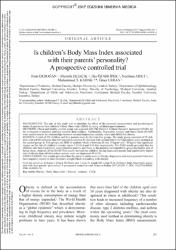| dc.contributor.author | Erdoğan, Fırat | |
| dc.contributor.author | Eliaçık, Mustafa | |
| dc.contributor.author | Özahi İpek, İlke | |
| dc.contributor.author | Arıcı, Neslihan | |
| dc.contributor.author | Kadak, Muhammed Tayyip | |
| dc.contributor.author | Ceran, Ömer | |
| dc.date.accessioned | 10.07.201910:49:13 | |
| dc.date.accessioned | 2019-07-10T20:01:47Z | |
| dc.date.available | 10.07.201910:49:13 | |
| dc.date.available | 2019-07-10T20:01:47Z | |
| dc.date.issued | 2017 | en_US |
| dc.identifier.citation | Erdoğan, F., Eliaçık, M., Özahi İpek, İ., Arıcı, N., Kadak, M. T. ve Ceran, Ö. (2017). Is children's body mass index associated with their parents' personality? A prospective controlled trial. Minerva Pediatrica, 69(4), 281-287. https://dx.doi.org/10.23736/S0026-4946.16.04241-9 | en_US |
| dc.identifier.issn | 0026-4946 | |
| dc.identifier.issn | 1827-1715 | |
| dc.identifier.uri | https://dx.doi.org/10.23736/S0026-4946.16.04241-9 | |
| dc.identifier.uri | https://hdl.handle.net/20.500.12511/3446 | |
| dc.description | WOS: 000408927800008 | en_US |
| dc.description | PubMed ID: 26329657 | en_US |
| dc.description.abstract | BACKGROUND: The aim of this study was to elucidate the effect of the personal characteristics and psychological status of parents on their children's Body Mass Index (BMI) by using validated questionnaires. METHODS: Obese and healthy control group was assessed with The Parental Attitude Research Instrument (PARI) for the evaluation of parental attitudes towards their children. Additionally, Depression Anxiety and Stress Scale (DASS) were used to assess the relationships between parental depression, anxiety, stress and childhood obesity. RESULTS: A total of 105 children and their parents were divided into two groups. The study group consisted of 58 children with a BMI of higher than 85th percentile whereas 47 children with normal BMI (<85th percentile) were included as the control group. In both groups, the BMI of mothers which is between 25-and 30 kg/m(2) and > 30 kg/m(2) had significant impact on the risk of children's obesity status 1.12-fold and 3.68-fold respectively. The PARI results provided that the children who had disciplined, over-protective parents and those in the parental incompatibility group had higher risk of being obese. Analysis of the DASS Test results showed that children having depressed parents had significantly higher risk of obesity than children whose parents were not depressed (P<0.05). CONCLUSIONS: Our results provided that, the parent's status such as obesity, depression and strict personal behaviors have negative impact on their children's weight which is resulting with obesity. | en_US |
| dc.language.iso | eng | en_US |
| dc.publisher | Edizioni Minerva Medica | en_US |
| dc.rights | info:eu-repo/semantics/embargoedAccess | en_US |
| dc.subject | Obesity | en_US |
| dc.subject | Body Mass Index | en_US |
| dc.subject | Parents | en_US |
| dc.subject | Attitude | en_US |
| dc.subject | Child | en_US |
| dc.title | Is children's body mass index associated with their parents' personality? A prospective controlled trial | en_US |
| dc.type | article | en_US |
| dc.relation.ispartof | Minerva Pediatrica | en_US |
| dc.department | İstanbul Medipol Üniversitesi, Tıp Fakültesi, Dahili Tıp Bilimleri Bölümü, Çocuk Sağlığı ve Hastalıkları Ana Bilim Dalı | en_US |
| dc.department | İstanbul Medipol Üniversitesi, Tıp Fakültesi, Cerrahi Tıp Bilimleri Bölümü, Göz Hastalıkları Ana Bilim Dalı | en_US |
| dc.department | İstanbul Medipol Üniversitesi, İnsan ve Toplum Bilimleri Fakültesi, Psikoloji Bölümü | en_US |
| dc.authorid | 0000-0002-6299-7067 | en_US |
| dc.authorid | 0000-0002-2563-2149 | en_US |
| dc.authorid | 0000-0002-8968-4079 | en_US |
| dc.identifier.volume | 69 | en_US |
| dc.identifier.issue | 4 | en_US |
| dc.identifier.startpage | 281 | en_US |
| dc.identifier.endpage | 287 | en_US |
| dc.relation.publicationcategory | Makale - Uluslararası Hakemli Dergi - Kurum Öğretim Elemanı | en_US |
| dc.identifier.doi | 10.23736/S0026-4946.16.04241-9 | en_US |
| dc.identifier.wosquality | Q4 | en_US |
| dc.identifier.scopusquality | Q3 | en_US |


















